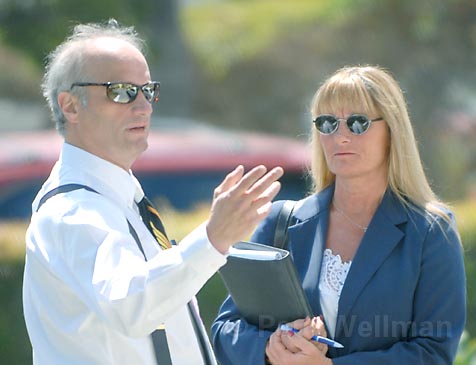Union Activists Disloyal, News-Press Lawyer Claims
One Swears, The Other Doesn't

In the fourth week of the trial of the Santa Barbara News-Press on charges of unfair labor practices, lawyers for the National Labor Relations Board (NLRB) continued to call former News-Press writers and editors to the witness stand to testify that Ampersand Publishing, the paper’s parent company, retaliated against legally protected union activities. Barry Cappello, defending Ampersand, insisted that the NLRB had it exactly backward: Union activists tried to interfere with legitimate management prerogatives; in so doing, they were the ones who violated the rules of engagement.
Almost the only thing that both sides agreed on was that the employees’ gripes had nothing to do with wages or hours-the usual focus of union activity-and everything to do with journalistic ethics. Former News-Press reporter Dawn Hobbs, on the stand for a day and a half, referred to the “wall” that should protect news from publishing interests and editorial opinion. But during his daylong cross-examination of Hobbs, Cappello attacked the very notion of such a wall. “Are you aware of other publishers who implement newsroom policies?” asked Cappello. When she answered no, he told the judge he would bring in evidence to show that it is common for an editorial page editor to answer to a newsroom editor, and vice versa, and that often the two positions are held by one and the same person.
Employees who made a public issue of McCaw’s editorial involvement merely disparaged the company’s product, Cappello said, and were therefore guilty of disloyalty, a fireable offense. The NLRB is seeking the reinstatement of eight fired reporters, with back pay and benefits; the paper does not have to hire back disloyal employees, Cappello said. “Most of the union campaign,” Cappello said, “was an attempt to embarrass the publisher and drive her away from her own business.” He entered into evidence a union-sponsored radio ad which included the line, “Don’t let McCaw control the news,” and quizzed Hobbs, fired for alleged disloyalty, on a “Banish the Bias” sign she displayed on her windshield.
Cappello filed a brief this week arguing that journalistic ethics are not a union issue, and therefore not a legally protected topic of employee protests. Administrative Law Judge William Kocol asked the NLRB attorneys to respond with a brief defending their position that journalistic integrity is legal union fodder because it is part of reporters’ “terms and conditions of employment.” On Tuesday, between testimony from Colby Frazier, Starshine Roshell, and Melissa Evans, NLRB attorney Steve Wyllie explained that ethical concerns were an employment condition because reporters had to worry about being reprimanded if their articles did not reflect the publisher’s whims.
Cappello and the judge strove in vain on Monday to get Hobbs to say “Fuck you, Travis.” The reference was to Travis Armstrong, the editorial page editor who has been sitting in the courtroom as Ampersand’s representative. The News-Press had disciplined Hobbs for allegedly using the phrase while Jerry Roberts was being escorted from the building on July 6, 2006. Hobbs denied the allegation, saying editor Jane Hulse and writer Starshine Roshell were the ones who swore. The purpose of the exercise, said Cappello, was for Armstrong to be able to determine whether it was indeed her voice he had heard. Hobbs admitted to frequently using profanity in the newsroom, but she balked at participating in Cappello’s re-enactment.
In trying to induce Hobbs to cooperate, Cappello intoned the word fuck repeatedly, sometimes to demonstrate its acceptability for courtroom purposes, sometimes to show the tone in which he thought she had shouted it. Finally, Cappello gave up and said Hobbs could say “Hey you, Travis.” After some cajoling by the judge, Hobbs complied.
The following day, Roshell seemed happy to demonstrate how she had called out, on July 6, “Fuck you, Travis!” Armstrong, meanwhile, sat stoically in the front row.



